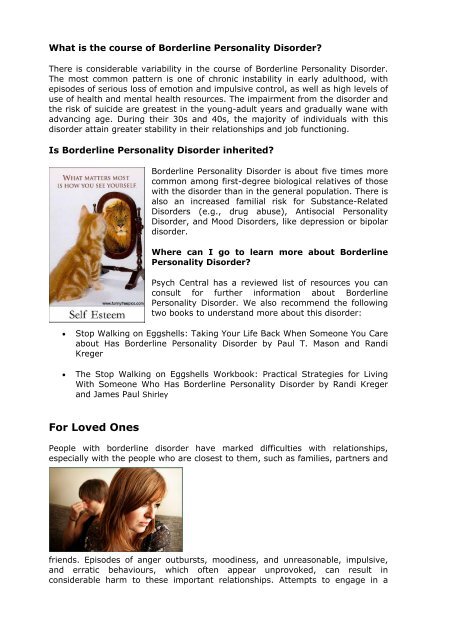personality disorders explained
Antisocial Personality Disorder, Codependence, Narcissism and Borderline
Antisocial Personality Disorder, Codependence, Narcissism and Borderline
Create successful ePaper yourself
Turn your PDF publications into a flip-book with our unique Google optimized e-Paper software.
What is the course of Borderline Personality Disorder?<br />
There is considerable variability in the course of Borderline Personality Disorder.<br />
The most common pattern is one of chronic instability in early adulthood, with<br />
episodes of serious loss of emotion and impulsive control, as well as high levels of<br />
use of health and mental health resources. The impairment from the disorder and<br />
the risk of suicide are greatest in the young-adult years and gradually wane with<br />
advancing age. During their 30s and 40s, the majority of individuals with this<br />
disorder attain greater stability in their relationships and job functioning.<br />
Is Borderline Personality Disorder inherited?<br />
Borderline Personality Disorder is about five times more<br />
common among first-degree biological relatives of those<br />
with the disorder than in the general population. There is<br />
also an increased familial risk for Substance-Related<br />
Disorders (e.g., drug abuse), Antisocial Personality<br />
Disorder, and Mood Disorders, like depression or bipolar<br />
disorder.<br />
Where can I go to learn more about Borderline<br />
Personality Disorder?<br />
Psych Central has a reviewed list of resources you can<br />
consult for further information about Borderline<br />
Personality Disorder. We also recommend the following<br />
two books to understand more about this disorder:<br />
<br />
<br />
Stop Walking on Eggshells: Taking Your Life Back When Someone You Care<br />
about Has Borderline Personality Disorder by Paul T. Mason and Randi<br />
Kreger<br />
The Stop Walking on Eggshells Workbook: Practical Strategies for Living<br />
With Someone Who Has Borderline Personality Disorder by Randi Kreger<br />
and James Paul Shirley<br />
For Loved Ones<br />
People with borderline disorder have marked difficulties with relationships,<br />
especially with the people who are closest to them, such as families, partners and<br />
friends. Episodes of anger outbursts, moodiness, and unreasonable, impulsive,<br />
and erratic behaviours, which often appear unprovoked, can result in<br />
considerable harm to these important relationships. Attempts to engage in a

















